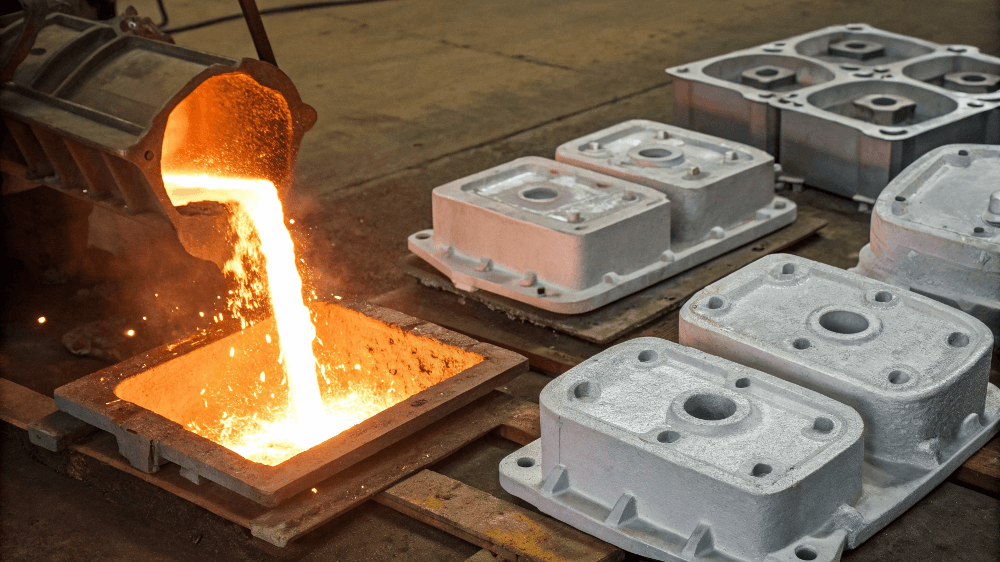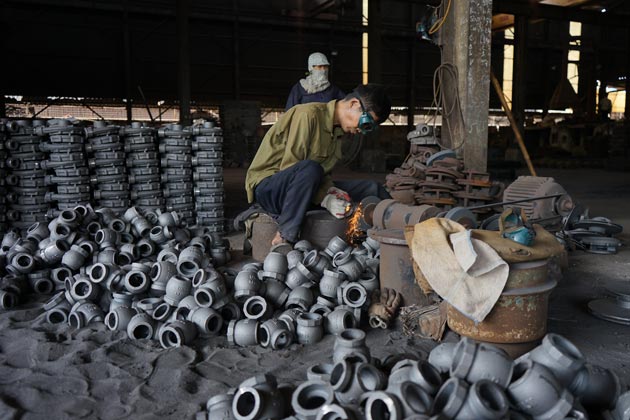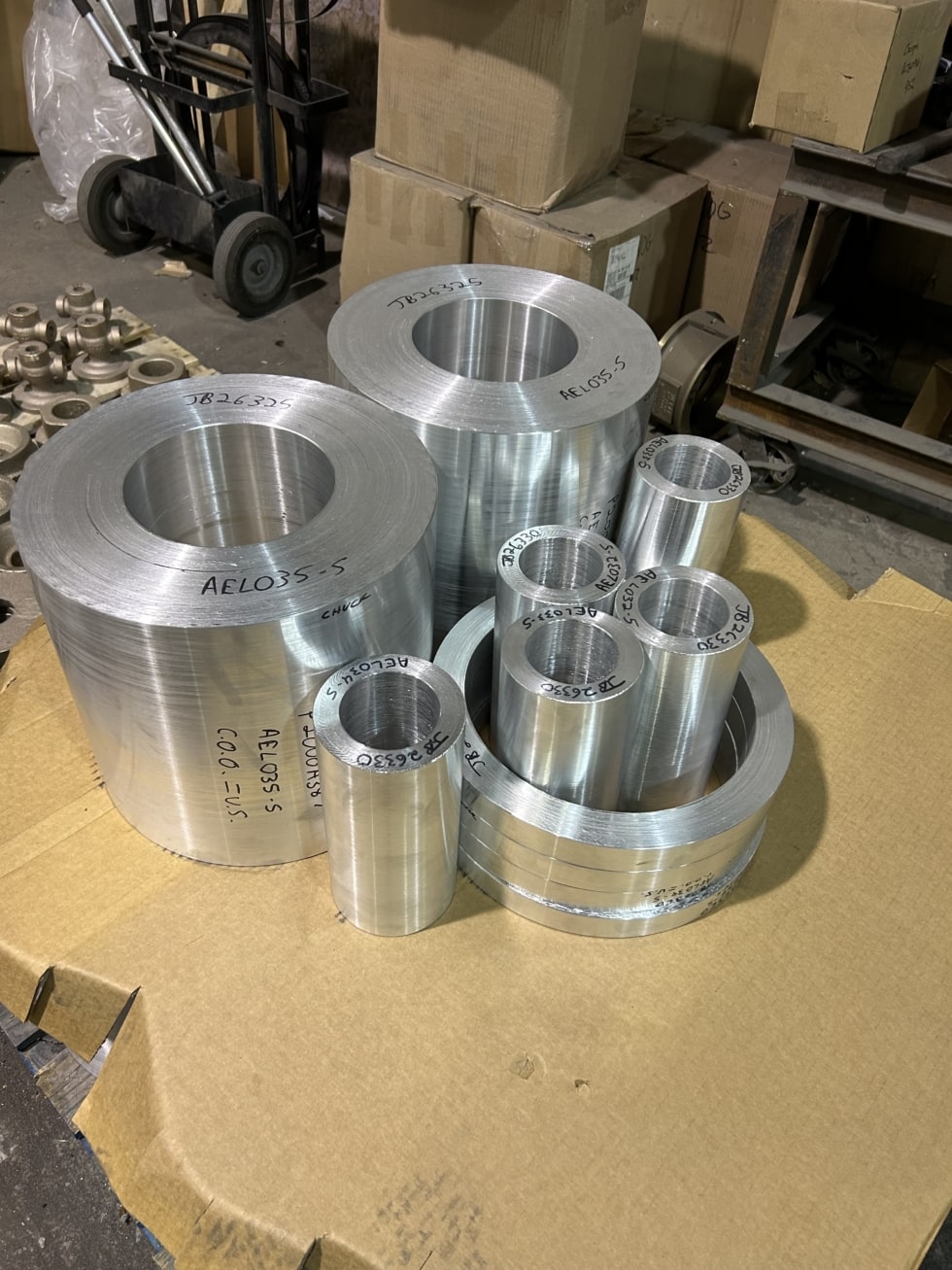Aluminum Foundry Wisconsin remains a trusted partner in casting solutions
Discovering the Vital Function of Light Weight Aluminum Factory in Modern Production Processes
Light weight aluminum foundries serve a critical feature in contemporary manufacturing. They convert raw light weight aluminum right into necessary components throughout various sectors. This conversion process is marked by innovative spreading techniques that boost efficiency. In addition, the shops are significantly adopting lasting practices, reflecting a shift in the direction of ecologically responsible manufacturing. Comprehending their duty discloses not just their effect on production however likewise the more comprehensive ramifications for development and sustainability in the market. What lies ahead for light weight aluminum shops in this advancing landscape?
The Significance of Aluminum in Modern Manufacturing
Aluminum plays a crucial function in modern-day manufacturing due to its distinct homes. This light-weight steel is recognized for its outstanding strength-to-weight ratio, making it a perfect selection for numerous applications. Its deterioration resistance boosts durability, decreasing maintenance prices and raising item durability. The pliability and ductility of light weight aluminum enable intricate designs and complicated forms, which are important in markets ranging from vehicle to aerospace. In addition, aluminum's electric and thermal conductivity makes it appropriate for electric parts and warmth exchangers. The recyclability of light weight aluminum substantially adds to lasting manufacturing methods, as it can be reused without loss of high quality. This adaptability not just sustains innovation however also assists fulfill the growing need for ecologically pleasant solutions. In general, light weight aluminum's distinctive characteristics setting it as a basic product in modern manufacturing, driving advancements and effectiveness throughout multiple sectors.
Overview of the Light Weight Aluminum Casting Process
The light weight aluminum casting procedure is a crucial technique for shaping this versatile metal right into complex types matched for a wide variety of applications. This process usually starts with melting aluminum ingots in a heating system, where temperature levels can exceed 1,200 degrees Fahrenheit. When the light weight aluminum gets to a liquified state, it is put right into a mold and mildew created to produce the desired shape.
There are various casting approaches utilized, including sand casting, pass away spreading, and investment spreading, each offering distinct benefits for different applications. After the light weight aluminum cools and strengthens, the mold and mildew is removed, disclosing the actors component, which might call for further finishing procedures such as machining or surface area therapy to attain the required specs.
Quality assurance is essential throughout the casting procedure, making sure that the final products meet sector standards for strength, longevity, and dimensional precision. This meticulous strategy highlights the relevance of aluminum spreading in contemporary manufacturing.
Secret Benefits of Light Weight Aluminum Foundries
Light weight aluminum factories supply numerous key benefits that enhance modern-day manufacturing processes. The light-weight nature of aluminum adds to substantial weight savings in numerous applications, while affordable manufacturing services make it an appealing option for manufacturers. Furthermore, the flexible style capacities of light weight aluminum permit complicated and innovative product development, conference diverse sector needs.
Light-weight Material Advantages
In the domain of contemporary production, lightweight products have become a vital emphasis, with aluminum shops supplying substantial benefits. Aluminum, recognized for its reduced density yet durable stamina, allows the production of parts that reduce general weight without jeopardizing structural stability. This characteristic is specifically valuable in markets such as automotive and aerospace, where reducing weight converts to boosted fuel performance and performance. Moreover, light weight aluminum's excellent deterioration resistance improves item durability, lowering maintenance demands. The flexibility of light weight aluminum shop processes enables intricate geometries and detailed designs, promoting innovative applications. Furthermore, aluminum's recyclability adds to sustainability efforts, making it an eco-friendly selection in contemporary production techniques. These light-weight material benefits placement light weight aluminum foundries as essential players ahead of time modern manufacturing.
Cost-efficient Manufacturing Solutions
While several materials can be utilized in production, light weight aluminum factories stand out for their affordable options that boost production efficiency. The processes used in aluminum foundries, such as die casting and sand spreading, enable high-volume production at lower expenses compared to other materials. The lightweight nature of aluminum decreases delivery and handling expenses, even more contributing to total savings. Additionally, aluminum's recyclability lessens waste and reduces product costs, making it an environmentally friendly selection. The fast turnaround times regular of light weight aluminum shops make it possible for suppliers to react quickly to market needs, ensuring affordable prices. Additionally, the toughness of light weight aluminum elements causes reduce maintenance costs over the item's lifecycle, strengthening its position as a monetarily sensible alternative in contemporary production.
Versatile Design Capabilities
The versatility of aluminum foundries greatly boosts their charm in modern production. They provide a vast array of design capabilities, making it possible for the production of complex and intricate forms that satisfy specific customer needs. This versatility allows for the combination of various functions, such as lightweight frameworks and improved thermal residential or commercial properties, making light weight aluminum an ideal choice for varied applications. Furthermore, the ability to make use of different casting techniques, consisting of sand, die, and financial investment spreading, more expands their style possibility. This flexibility not only suits customized layouts however also promotes rapid prototyping, minimizing time to market. As a result, light weight aluminum foundries play a necessary function in making certain that manufacturers can innovate while preserving performance and top quality in their production processes.
Developments in Light Weight Aluminum Spreading Technologies
As improvements in innovation improve the landscape of production, technologies in aluminum casting have emerged as a pivotal pressure driving effectiveness and high quality. One considerable advancement is the introduction of computer numerical control (CNC) machining, which enhances precision in mold-making and reduces manufacturing time (Aluminum Foundry). In addition, the adoption of innovative simulation software program enables factories to anticipate and correct potential flaws in the casting process, resulting in improved item honesty
Strategies such as low-pressure die spreading and vacuum spreading are getting traction, offering enhanced control over steel flow and reducing porosity in last products. The combination of 3D printing likewise offers possibilities for rapid prototyping and the creation of intricate geometries that were formerly unattainable.
These developments not just boost the competitive side of light weight aluminum factories yet likewise meet the advancing demands of markets varying from automobile to aerospace, guaranteeing top quality parts with maximized performance. - Aluminum Foundry
Sustainability Practices in Aluminum Foundries
Acknowledging the urgent demand for ecological responsibility, aluminum factories are increasingly embracing sustainability methods that decrease their ecological footprint. These practices incorporate various techniques targeted at reducing waste, saving power, and using recycled products. Several factories have actually applied sophisticated recycling systems, enabling them to reclaim and recycle aluminum scrap, substantially decreasing material intake and waste production.
Furthermore, energy-efficient technologies, such as electric melting heaters, are being adopted to reduce greenhouse gas emissions. Factories are concentrating on water conservation through closed-loop systems, which reuse procedure water, consequently reducing freshwater usage.
Carrying out sustainability accreditations and sticking to sector criteria better enhances their commitment to environmental stewardship. By welcoming these techniques, light weight aluminum shops not just add to a greener world however likewise boost their functional efficiency and competition out there. This change towards sustainable operations mirrors a growing trend in modern-day manufacturing that prioritizes both financial and environmental health.
The Duty of Light Weight Aluminum Foundries in the Supply Chain
Light weight aluminum shops offer as critical nodes in the manufacturing supply chain, offering important products that fuel different markets. They play a substantial function in transforming raw light weight aluminum into functional elements through spreading procedures, which are essential for industries such as auto, aerospace, and building. By producing light-weight yet durable components, aluminum shops add to improved item performance and power performance.
The combination of factories into the supply chain ensures a consistent circulation of high-grade light weight aluminum products, enabling producers to fulfill market demands quickly. Furthermore, foundries usually team up with makers and providers to enhance product sourcing and reduce lead times, fostering a more streamlined manufacturing process. Their competence in metallurgy and spreading methods enables them to adapt and introduce to the evolving demands of different fields. Subsequently, aluminum factories are essential for preserving the stability and efficiency of contemporary production procedures.

Future Trends in Aluminum Manufacturing Processes
The future of aluminum production procedures is poised for significant transformation through automation and sustainable practices. Advancements in automated systems are expected to check boost performance and precision in manufacturing, while a growing focus on sustainability will drive the market in the direction of eco-friendly techniques. With each other, these trends will form an extra responsible and cutting-edge aluminum production landscape.
Automation in Aluminum Production
Recently, the integration of automation innovations has transformed aluminum production, causing enhanced effectiveness and accuracy. Automated systems improve numerous procedures, from melting and casting to completing, lowering human mistake and boosting output consistency. Advanced robotics and artificial intelligence formulas facilitate real-time tracking and adjustments, making certain perfect conditions throughout manufacturing. Aluminum Foundry. The usage of automated assisted lorries (AGVs) improves material handling, reducing downtime and labor prices. Additionally, data analytics play a vital function in anticipating upkeep, enabling for prompt interventions that decrease devices failures. As the demand for high-grade aluminum products proceeds to climb, producers are significantly adopting automation to stay competitive, enhance operations, and respond swiftly to market modifications while maintaining item integrity
Lasting Manufacturing Practices
An expanding emphasis on sustainable manufacturing methods is forming the future of light weight aluminum manufacturing. Firms are increasingly embracing environmentally friendly methods to reduce waste and decrease power consumption. Developments such as recycling efforts and the use of renewable resource resources are coming to be integral to the aluminum factory industry. By executing closed-loop systems, producers can significantly reduce their carbon footprint while maximizing source efficiency. On top of that, advancements in alloy formulations are allowing the creation of lighter, more powerful materials that call for much less power throughout production. Regulative pressures and customer demand for lasting items are driving these modifications, pressing makers to prioritize environmental factors to consider together with standard performance metrics. The pattern towards sustainability guarantees to transform light weight aluminum production, lining up industry experiment worldwide environmental objectives.
Often Asked Questions

What Are the Usual Applications of Light Weight Aluminum Castings in Everyday Products?
Usual applications of aluminum spreadings include automotive elements, aerospace components, house appliances, customer electronics, and industrial equipment. These versatile spreadings are preferred for their lightweight, deterioration resistance, and outstanding thermal conductivity in numerous industries.
Just How Do Aluminum Foundries Guarantee Quality Assurance in Their Manufacturing Processes?
Light weight aluminum shops execute strenuous quality assurance actions, consisting of normal examinations, material screening, and adherence to market criteria. These techniques guarantee consistency, longevity, and performance in the final products, eventually improving have a peek at this website consumer complete satisfaction and count on.

What Precaution Are Implemented in Aluminum Foundries Throughout Manufacturing?
Safety steps in light weight aluminum foundries throughout manufacturing consist of protective gear for workers, air flow systems to manage fumes, routine equipment upkeep, safety and security training programs, and adherence to regulative requirements to reduce dangers connected with molten steel handling.
How Does Aluminum Recycling Influence Foundry Operations and Sustainability?
Aluminum recycling significantly boosts foundry operations by lowering raw material prices and energy consumption. This technique promotes sustainability, reduces waste, and sustains round economy concepts, eventually profiting both the production and the atmosphere industry.
What Are the Typical Lead Times for Aluminum Casting Projects?
Typical preparation for light weight aluminum casting tasks vary, generally ranging from two to 6 weeks. Factors affecting these times include project complexity, product availability, and manufacturing capacity, all of which add to the general timeline.
Light weight aluminum factories offer a number of essential advantages that improve contemporary manufacturing procedures. In the domain name of contemporary manufacturing, lightweight products have ended up being a vital emphasis, with aluminum factories supplying substantial advantages. While many materials can be made use of in production, aluminum shops stand out this for their cost-efficient services that improve production performance. The convenience of light weight aluminum shops considerably improves their charm in modern production. Aluminum foundries serve as vital nodes in the production supply chain, supplying crucial materials that fuel numerous markets.